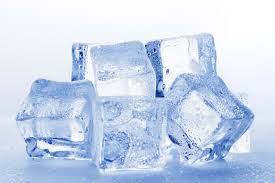ice
英 [aɪs]
美 [aɪs]
- n. 冰;冰淇淋;矜持;(俚)钻石
- vt. 冰镇;结冰
- vi. 结冰
- adj. 冰的
- n. (Ice)人名;(英)艾斯;(法)伊斯
使用频率:

记忆方法
将“ice”与“易”字结合记忆,想象一个冰块很容易就融化,提示自己“ice”是“冰”的意思。
以上内容由AI生成, 仅供参考和借鉴
中文词源
ice 冰
来自古英语is,冰。
英语词源
- ice
-
ice: [OE] Ice is a widespread word among the Germanic languages – German has eis, for instance. Dutch ijs, and Swedish and Danish is – but beyond that its connections are somewhat dubious. Some of the more easterly Indo- European languages have or had similar-looking forms, including Old Iranian isu- ‘frosty, icy’, modern Iranian yak ‘ice’, and Afghan asaī ‘frost’, which suggest the possibility of a common source. Iceberg [18] was perhaps an adaptation of Danish and Norwegian isberg, literally ‘ice mountain’.
- ice (n.)
- Old English is "ice" (also the name of the rune for -i-), from Proto-Germanic *isa- (cognates: Old Norse iss, Old Frisian is, Dutch ijs, German Eis), with no certain cognates beyond Germanic, though possible relatives are Avestan aexa- "frost, ice," isu- "frosty, icy;" Afghan asai "frost." Slang meaning "diamonds" is attested from 1906.
Ice cube attested from 1904. Ice age attested from 1832. To break the ice "to make the first opening to any attempt" is from 1580s, metaphoric of making passages for boats by breaking up river ice though in modern use usually with implications of "cold reserve." - ice (v.)
- c. 1400, ysen, "cover with ice," from ice (n.). Related: Iced; icing.
权威例句
- 1. His mother's voice was one he knew; ice cold and deadly.
- 母亲的声音是他很熟悉的:冰冷、无情。
- 2. The deal was put on ice for three months.
- 该交易被搁置了3个月。
- 3. The only sound was the crackle of breaking ice.
- 唯一的声响是冰层噼噼啪啪碎裂的声音。
- 4. The $40 million-a-month aid payments will remain on ice.
- 每月4,000万美元的援助款项将继续搁置下去。
- 5. The purpose of the visit was to navigate into an ice-filled fiord.
- 这次出行是为了能驶入冰雪覆盖的峡湾。